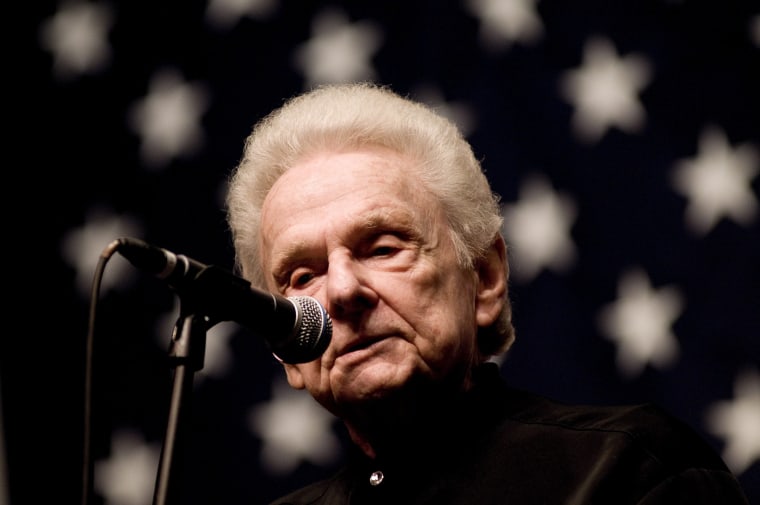Ralph Stanley, the godfather of traditional bluegrass music who found a new generation of fans late in life thanks to his Grammy-winning music for the 2000 movie "O Brother, Where Art Thou?" died Thursday at the age of 89, his grandson announced.
Stanley — a virtuoso clawhammer banjoist and founder of the groundbreaking band the Clinch Mountain Boys — "went peacefully in his sleep due to a long, horrible battle with skin cancer," Nathan Stanley, a popular gospel and bluegrass musician in his own right, wrote on his website late Thursday.
Ralph Stanley's official Facebook page reprinted the announcement a few minutes later.
Nathan Stanley paid tribute to his grandfather earlier this year in a cut from his latest album, "Controversial Man":
Ralph Stanley grew up in southwest Virginia and learned to play the thumping, percussive style of banjo called clawhammer in his teens, he told Virginia Living magazine in 2012. He started by modeling his style on that of Earl Scruggs, he said, before streamlining and simplifying his playing into a distinctive sound that many imitated but could never duplicate.
"His musical importance cannot be overemphasized," the bluegrass scholar John Curtis Goad wrote Thursday night at Bluegrass Today. "Stanley was one of the few artists of any genre whose music had a significant impact on several generations of listeners."
After serving in the Army, Stanley and his brother Carter formed a band called The Stanley Brothers and the Clinch Mountain Boys in 1946. They played what was then called "Appalachian" and "hillbilly" music. The term "bluegrass" — which Stanley never liked — hadn't yet been invented, and he called it "old-time mountain soul."
The band became Ralph Stanley and His Clinch Mountain Boys after Carter Stanley died in 1966. Among the many well-known musicians who have rotated through the band over the years are Ricky Skaggs, Keith Whitley, Melvin Goins, Marty Stuart, Larry Sparks and Jimmy Vaughn.

The Clinch Mountain Boys were a staple on the bluegrass circuit through the 1960s, '70s, '80s and '90s. Then, in 1998, Stanley joined with an array of music superstars, including George Jones, Bob Dylan, Vince Gill and Dwight Yoakam, to release "Clinch Mountain Country," which soared up the country and bluegrass charts and won the Recorded Event of the Year award from the International Bluegrass Music Association.
A year later, he repeated the feat, winning the award again with female superstars like Dolly Parton and Joan Baez on "Clinch Mountain Sweethearts."
In 2000 — at age 73 — Stanley reached a new level of stardom when he performed much of the music for the Coen brothers' movie "O Brother, Where Art Thou?" The movie's soundtrack topped the Billboard charts for 75 weeks, and Stanley's a cappella version of "O Death" won him the first of his three Grammy Awards, for Best Country Male Vocal Performance.
Stanley continued performing until his cancer forced him to stop as he approached age 90. As recently as February, he and his band were nominated for a Grammy for Best Bluegrass Album for "Man of Constant Sorrow."
At the time of his death, he was the oldest living member of the Grand Ole Opry, which said Thursday night that "his music will live on forever."
Stanley won numerous honors over his long career, including several honorary university doctorates, leading to the name he often performed under, Dr. Ralph Stanley. In 1985, he became the inaugural winner of the National Endowment for the Humanities' Traditional American Music Award, and in 1992, he was inducted into the International Bluegrass Music Association Hall of Honor.
The Library of Congress honored him with its "Living Legend" medal in 2000. In 2014, he was elected to the American Academy of Arts and Sciences.
News of Stanley's death produced a stream of tributes from some of country and bluegrass music's biggest names Thursday night.
